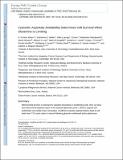Cytosolic Aspartate Availability Determines Cell Survival When Glutamine Is Limiting
Author(s)
Alkan, H. Furkan; Luengo, Alba; Lau, Allison N.; Lewis, Caroline A.; Vander Heiden, Matthew G.
DownloadAccepted version (2.713Mb)
Publisher with Creative Commons License
Publisher with Creative Commons License
Creative Commons Attribution
Terms of use
Metadata
Show full item recordAbstract
Mitochondrial function is important for aspartate biosynthesis in proliferating cells. Here, we show that mitochondrial aspartate export via the aspartate-glutamate carrier 1 (AGC1) supports cell proliferation and cellular redox homeostasis. Insufficient cytosolic aspartate delivery leads to cell death when TCA cycle carbon is reduced following glutamine withdrawal and/or glutaminase inhibition. Moreover, loss of AGC1 reduces allograft tumor growth that is further compromised by treatment with the glutaminase inhibitor CB-839. Together, these findings argue that mitochondrial aspartate export sustains cell survival in low-glutamine environments and AGC1 inhibition can synergize with glutaminase inhibition to limit tumor growth. Alkan et al. show that, under conditions in which cytosolic glutamine is limiting, mitochondrial aspartate export, via the aspartate-glutamate carrier 1 (AGC1), supports cell proliferation and cellular redox homeostasis and that AGC1 inhibition can synergize with glutaminase inhibition to limit tumor growth.
Date issued
2018-11Department
Whitehead Institute for Biomedical Research; Koch Institute for Integrative Cancer Research at MITJournal
Cell Metabolism
Publisher
Elsevier BV
Citation
Alkan, H. Furkan et al. “Cytosolic Aspartate Availability Determines Cell Survival When Glutamine Is Limiting.” Cell Metabolism 28 (2018): 706-720 © 2018 The Author(s)
Version: Author's final manuscript
ISSN
1550-4131